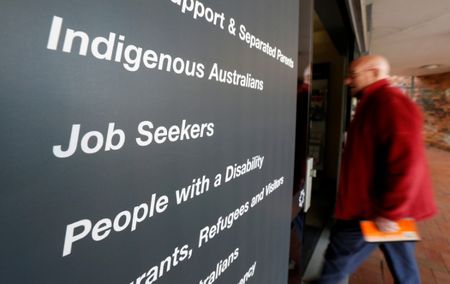By Wayne Cole
SYDNEY (Reuters) -Australian job creation blew past expectations in May as unemployment dived to pre-pandemic lows, a major upside surprise that will test policy makers’ commitment to keeping rates at historic lows for another two years or more.
Thursday’s data from the Australian Bureau of Statistics (ABS) showed 115,200 net new jobs were created in May, far above forecasts for a 30,000 gain. Full-time jobs jumped by 97,500 and hours worked rose sharply, pointing to expanding output.
Unemployment dropped to 5.1%, from 5.5% in April, a remarkable recovery from a high of 7.5% hit last July when coronavirus lockdowns tipped the economy into recession.
Such strength will be warmly welcomed by the Reserve Bank of Australia (RBA), but also challenges the bank’s belief that it will be years before the labour market is tight enough to drive wages and inflation sustainably higher.
The RBA has been the odd man out as other rich world central banks turn more hawkish, notably the U.S. Federal Reserve and the Reserve Bank of New Zealand.
“In light of the recent shift in rhetoric overseas the RBA appears incredibly dovish, particularly given the relative strength of the economy,” said Gareth Aird, head of Australian economics at CBA.
The surprise jobs data came just after RBA Governor Philip Lowe argued that wages would remain subdued for some time, in part due to a widespread focus on cost cutting by firms.
Firms were using non-wage strategies to retain and attract staff, or even choosing to ration output instead, Lowe said in a speech delivered earlier on Thursday.
As a result, the RBA had signalled it would not raise the 0.1% cash rate until inflation was back in its 2-3% target band and that was unlikely until 2024.
Yet the May data showed unemployment already down at 5.1%, when the RBA had not expected to reach 5% until the end of this year. Lowe has said it could take a jobless rate of 4% or lower to push annual wage growth above 3% as desired.
The data added to the case for the RBA to scale back its bond yield target and asset buying programme at its July policy meeting, said Ben Udy, an economist at Capital Economics.
“We expect the RBA to announce a flexible asset purchase programme at its next meeting,” Udy said.
“But if the labour market recovery holds up as we expect, the Bank may be making use of that flexibility by tapering asset purchases sooner than November as we had anticipated.”
(Reporting by Wayne Cole; Editing by Himani Sarkar and Jane Wardell)





